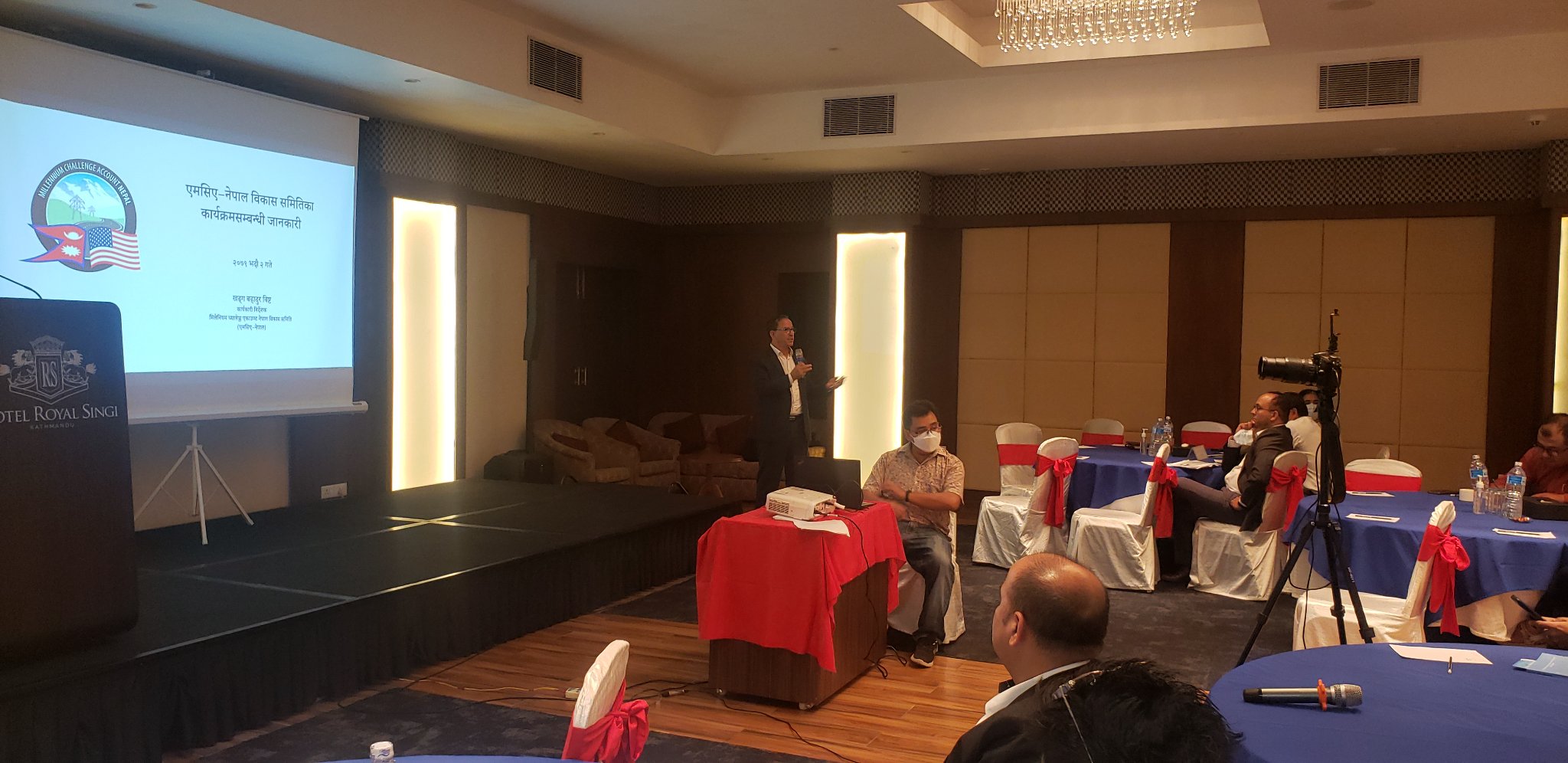0%

An interaction program organized by MCA-Nepal in Kathmandu on Monday.
KATHMANDU: The project under the Millennium Challenge Corporation (MCC) Compact is set to start next year.
The power transmission line and road infrastructure to be built under the MCC is starting from August 2023.
The Millennium Challenge Account Nepal Development Committee (MCA-Nepal), which was formed by the government for the implementation of the US-assistance grant MCC, announced at a special program on Thursday that the construction work of projects under MCC would start from August next year.
MCA Nepal Executive Director Khadga Bahadur Bisth said that preparations were underway to start construction works from August 2023.
“MCC is coming into implementation in the next one year,” he said, adding, “Works such as counting the trees that fall on the right of way of the transmission line project and acquisition of land is undergoing at the moment.”
He said preparations are underway to call for a global tender for the construction of a 315 km long transmission line under MCC at the end of this year. MCA-Nepal has already finished documentation to this end.
He added that five out of six prerequisites for the construction of the transmission line project have been met and construction would begin soon.
Pre-requisites for the project include land acquisition, felling of trees and access roads to the construction area, are being undertaken.
He said excess politicization of MCC had delayed its implementation.
The House of Representatives on February 27 ratified the MCC thereby paving the way to implement projects under the grant agreement.
What is the MCC Nepal Compact?
The MCC Nepal Compact is a five-year USD 500 million grant agreement signed between the Government of Nepal (GoN) and Millennium Challenge Corporation (MCC) on 14 September 2017. The GoN is investing an additional USD 130 million in the program, for a total of USD 630 million.
What is the Millennium Challenge Account Nepal (MCA-Nepal)?
MCA-Nepal is a Development Board (Bikas Samiti), a government-owned legal entity established in April 2018 (Baisakh 2075 BS) under Development Board Act, 2013 BS (1956 AD) by the GoN. It is the agency for implementing the MCC Nepal Compact projects.
Who is responsible for the operations of MCA-Nepal?
MCA-Nepal Development Board exercises the right and obligation to oversee, manage and implement the Compact. MCA-Nepal is led by an Executive Director, who is supported by directors, managers, specialists and other staff.
MCA-Nepal has a governing body of the Board of Directors with the representation from the Ministry of Finance, Ministry of Energy, Ministry of Physical Infrastructure and Transportation and Nepal Electricity Authority (NEA) among others. It is chaired by the Secretary of Ministry of Finance.
What role does the Government of Nepal (GoN) have in program implementation?
The GoN plays a central role. MCA-Nepal, established with approval from the Council of Ministers in April 2018, is a GoN entity.
How many people are working at MCA-Nepal now? How many people will the program ultimately employ?
Currently, around 60 staff work for MCA-Nepal. Once construction begins, the program is expected to provide direct employment opportunities to approximately 7,500 people over the duration of the projects.
Will MCA-Nepal be exempted from paying taxes?
The assistance provided under the MCC agreement is a tax-free grant. However, MCA-Nepal staff pay taxes in accordance to the income tax regulations. Any equipment, goods or services procured through the grant are exempt from the payment of taxes and duties. MCA-Nepal does not pay any tax as it is a non-income generating body.
What is the scope of the Electricity Transmission Project under MCA-Nepal?
The Electricity Transmission Project under MCA-Nepal will build around 315 kilometers of double circuit high capacity 400 kV transmission lines and three new electricity substations. The project will also provide technical assistance to the GoN in various energy sector undertakings.
What districts will the transmission lines pass through?
The transmission line will pass through Kathmandu, Sindhupalchowk, Nuwakot, Dhading, Makwanpur, Chitwan, Tanahun, Palpa, Nawalpur and Parasi districts.
What is the scope of the Road Maintenance Project?
The Road Maintenance Project aims to maintain road quality by supporting maintenance of commercially important roads. This is being done by introducing new technologies. Upon completion, the project is expected to result in significant cost and time savings in road maintenance in Nepal.
Which roads will be maintained and improved?
The focus will be the East-West Highway in Dang district. The section on which the new road maintenance will be piloted is the Dhankhola to Lamahi section of the East-West Highway.
Based on the results of the pilot, MCA-Nepal will further complete the Lamahi to Shivakhola section. At present, the total road segment proposed for maintenance in the East-West Highway is approximately 77 km.
Who will own the land leased/purchased for the Electricity Transmission Project to build transmission lines after five years?
The land will be acquired using Nepal’s Land Acquisition Act, 2034 BS and will be under the GoN’s ownership.
What will be the status of MCA-Nepal after the program period ends?
MCA-Nepal is responsible to complete the projects under the Compact within five years after the date of Entry into Force (EIF). After delivery of the projects, the government can dissolve the office or it can be given some other responsibility by changing its name, and all property of MCA-Nepal will be handed over to its line ministry or an entity, designated by the ministry.
What is MCC?
MCC is an independent U.S. foreign assistance agency with the mission of reducing poverty through economic growth. MCC forms partnerships with developing countries that are committed to good governance, economic freedom, and investing in their citizens.